|
|
United Nations Convention against Corruption
New York, 31 October 2003
- Introductory Note
- Procedural History
- Documents
- Status
- Photo
F o r t h c o m i n g
Introductory note to be published
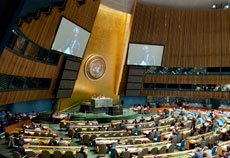 The United Nations Convention against Corruption entered into force on 14 December 2005, 90 days following the date of deposit of the thirtieth instrument of ratification, acceptance, approval or accession, in accordance with its article 68. The United Nations Convention against Corruption entered into force on 14 December 2005, 90 days following the date of deposit of the thirtieth instrument of ratification, acceptance, approval or accession, in accordance with its article 68.
The proposal to adopt an international convention on corruption emanated from the Eighth United Nations Congress on the Prevention of Crimes and the Treatment of Offenders, in 1990. In 2000, the Ad Hoc Committee on the Elaboration of a Convention against Transnational Organized Crime, which had incorporated corruption into its agenda, decided that a legal instrument, focused on corruption and independent of transnational organized crime, would be desirable. An Ad Hoc Committee for the Negotiation of a Convention against Corruption was set up by the General Assembly later that same year. In October 2003, the Ad Hoc Committee submitted a final text of the draft convention to the General Assembly for its approval. The Convention was adopted by the General Assembly by resolution 58/4 of 31 October 2003.
The Convention contains seventy-one articles. It is divided into eight chapters: Chapter I on “General Provisions”; Chapter II on “Preventive Measures”; Chapter III on “Criminalization and law enforcement”; Chapter IV on “International cooperation”; Chapter V on “Asset recovery”; Chapter VI on “Technical assistance and information exchange”; Chapter VII on “Mechanisms for implementation”; and Chapter VIII on “Final provisions”.
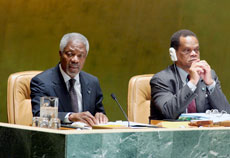 From 27 August to 7 September 1990, the Eighth United Nations Congress on the Prevention of Crime and the Treatment of Offenders was held at Havana, resulting, inter alia, in the adoption of resolution 7, entitled “Corruption in government” (A/CONF.144/28/Rev.1). Pursuant to that resolution, the Secretariat prepared a background paper on international action against corruption containing a draft international code of conduct for public officials (A/CONF.169/14), which was subsequently placed before the Commission on Crime Prevention and Criminal Justice at its fourth session in 1995. On the recommendation of the Commission at its fourth session (E/CN.15/1995/13), the Economic and Social Council adopted resolution 1995/14 of 24 July 1995, in which it requested the Secretary-General to continue his consultations with Governments to revise further the text of the draft code and to present it to the Commission at its fifth session. From 27 August to 7 September 1990, the Eighth United Nations Congress on the Prevention of Crime and the Treatment of Offenders was held at Havana, resulting, inter alia, in the adoption of resolution 7, entitled “Corruption in government” (A/CONF.144/28/Rev.1). Pursuant to that resolution, the Secretariat prepared a background paper on international action against corruption containing a draft international code of conduct for public officials (A/CONF.169/14), which was subsequently placed before the Commission on Crime Prevention and Criminal Justice at its fourth session in 1995. On the recommendation of the Commission at its fourth session (E/CN.15/1995/13), the Economic and Social Council adopted resolution 1995/14 of 24 July 1995, in which it requested the Secretary-General to continue his consultations with Governments to revise further the text of the draft code and to present it to the Commission at its fifth session.
At its fifth session in 1996 (E/1996/30-E/CN.15/1996/24), the Commission considered the report from the Secretary-General (E/CN.15/1996/5), which included a revised version of the draft code reflecting comments received from 36 Governments. On the recommendation of the Commission, and of the Economic and Social Council in its resolution 1996/8, the General Assembly adopted resolution 51/59 of 12 December 1996, which contained the International Code of Conduct for Public Officials and recommended the Code to Member States as a tool to guide their efforts against corruption.
On 28 July 1998, the Economic and Social Council, on the recommendation of the Commission at its seventh session (E/1998/30-E/CN.15/1998/11) by its draft resolution I, adopted resolution 1998/16, in which it decided to convene an open-ended meeting of governmental experts in order to explore ways of ensuring that the recent multilateral initiatives against corruption were effective and that an appropriate international strategy against corruption, including the proceeds thereof, was formulated in consultation with other intergovernmental organizations active in the area.. The Expert Group Meeting on Corruption and its Financial Channels met from 30 March to 1 April 1999 and considered issues such as improving international co-operation in combating corruption (E/CN.15/1999/10). The Expert Group submitted a number of recommendations and proposed, inter alia, that Member States consider elaborating a universal instrument on the subject.
On the recommendation of the Commission at its eighth session by its draft resolution IV (E/1999/30-E/CN.15/1999/12), and of the Economic and Social Council in its resolution 1999/22 of 28 July 1999, the General Assembly adopted resolution 54/128 at its fifty-fourth session on 17 December 1999. The Assembly requested the Ad Hoc Committee on the Elaboration of a Convention against Transnational Organized Crime (see the Procedural History on the Convention against Transnational Organized Crime) to incorporate into the draft convention measures against corruption linked to organized crime and requested the Committee to explore the desirability of an international instrument against corruption, either ancillary to or independent of the convention against transnational organized crime. On 22 December 1999, the General Assembly, by its resolution 54/205, further stressed its concern about the seriousness of problems posed by corruption and, inter alia, called for international and national measures to combat corrupt practices. It was decided to keep the matter under review.
In January 2000, the Ad Hoc Committee on the Elaboration of a Convention against Transnational Organized Crime held its seventh session (A/AC.254/25). The Committee was of the view that an international legal instrument against corruption was desirable and that it should be independent of the United Nations Convention against Transnational Organized Crime. The Committee transmitted its views to the Commission on Crime Prevention and Criminal Justice. On the recommendation of the Commission at its ninth session by its draft resolution III (E/2000/30-E/CN.15/2000/7), and of the Economic and Social Council in resolution 2000/13 on 27 July 2000, the General Assembly adopted resolution 55/61 on 4 December 2000 (A/55/PV.81). The General Assembly recognized that an effective international legal instrument against corruption, independent of the United Nations Convention against Transnational Organized Crime, was desirable and decided to establish an ad hoc committee for the negotiation of such an instrument. The Assembly furthermore requested that the Secretary-General should convene an intergovernmental open-ended expert group to examine and prepare draft terms of reference for the negotiation of the future legal instrument on the basis of the report of the Secretary-General and of recommendations of the Commission on Crime Prevention and Criminal Justice.
In April 2001, the Secretary-General submitted a report to the Commission, in which he analysed all relevant international instruments, other documents and recommendations addressing corruption, to serve as the basis for recommendations on the development of a legal instrument against corruption (E/CN.15/2001/3). He concluded that the mandate given by the Assembly in resolution 55/61 represented a unique opportunity to develop a global legal instrument against corruption that fully addressed the concerns of the international community as a whole.
The Intergovernmental Open-Ended Expert Group to Prepare Draft Terms of Reference for the Negotiation of an International Legal Instrument against Corruption met in Vienna from 30 July to 3 August 2001. The Intergovernmental Open-Ended Expert Group adopted its report (A/AC.260/2 and Corr.1), which contained a draft resolution, with draft terms of reference, to be submitted to the General Assembly at its fifty-sixth session, through the Commission on Crime Prevention and Criminal Justice.
The Informal Preparatory Meeting for the Ad Hoc Committee for the Negotiation of a Convention against Corruption held eight meetings in Buenos Aires, from 4 to 7 December 2001, attended by 56 States. Proposals and contributions concerning the substantive content of the draft convention had been submitted for consideration by 26 States. The Informal Preparatory Meeting proceeded to review the draft consolidated text prepared by the Secretariat, with a view to eliminating possible duplication and exploring the compatibility of the various proposals. The purpose of the review was to produce a text of the draft convention that would facilitate the work of the Ad Hoc Committee, as the basis for its work at its first session, together with any other proposals submitted by delegations during the negotiation process. At its final meeting on 7 December 2001, the Informal Preparatory Meeting adopted its report (A/AC.261/2).
On 31 January 2002 the General Assembly adopted resolution 56/260, by recommendation from the Commission on Crime Prevention and Criminal Justice at its tenth session by its draft resolution I (E/2001/30/Rev.1-E/CN.15/2001/13/Rev.1), and the Economic and Social Council by its resolution 2001/46 of 20 December 2001, in which it adopted the terms of reference presented by the Expert Group. It was decided that the Ad Hoc Committee for the Negotiation of a Convention against Corruption should negotiate a broad and effective convention, which subject to the final determination of its title, would be referred to as the “United Nations Convention against Corruption” and would adopt a multidisciplinary approach.
The text of the convention against corruption was negotiated during seven sessions of the Ad Hoc Committee for the Negotiation of the Convention against Corruption, held between 21 January 2002 and 1 October 2003 in Vienna. In 2002, the Ad Hoc Committee held three sessions as follows: from 21 January to 1 February 2002 (A/AC.261/4 & Corr.1); from 17 to 28 June 2002 (A/AC.261/7); and from 30 September to 11 October 2002 (A/AC.261/9). The Ad Hoc Committee had before it a draft convention against corruption, a consolidated version of the proposals submitted at the Informal Preparatory Meeting (A/AC.261/3/(Part I), (II), (III) and (IV)). In developing the draft convention, the Ad Hoc Committee considered, inter alia, the following elements: definitions; scope; protection of sovereignty; preventive measures; criminalization; sanctions and remedies; confiscation and seizure; jurisdiction; liability of legal persons; protection of witnesses and victims; promoting and strengthening international cooperation; preventing and combating the transfer of funds of illicit origin derived from acts of corruption, including the laundering of funds, and returning such funds; technical assistance; collection, exchange and analysis of information; and mechanisms for monitoring implementation. By the end of its third session, the Committee had begun the second reading of the draft convention, based on the revised text (A/AC.261/3/Rev.1 & Corr.1 & Add.1).
On the recommendation of the Commission at its eleventh session by its draft resolution II (E/2002/30-E/CN.15/2002/14) and of the Economic and Social Council by its resolution 2002/9 of 24 July 2002, the General Assembly adopted resolution 57/169 on 18 December 2002. The General Assembly noted the progress made by the Ad Hoc Committee and urged the Ad Hoc Committee to endeavour to complete its work by the end of 2003. The General Assembly also accepted with appreciation the offer made by the Government of Mexico to host a high-level political conference for the purpose of signing the convention and decided to convene the conference for a period of three days before the end of 2003.
In 2003, the Ad Hoc Committee held four sessions: from 13 to 24 January 2003 (A/AC.261/13); from 10 to 21 March 2003 (A/AC.261/16); from 21 July to 8 August 2003 (A/AC.261/22); and from 29 September to 1 October 2003 (A/AC.261/25). At the fourth session, the Ad Hoc Committee continued and completed the second reading of the draft convention. The Chairman of the Ad Hoc Committee further requested all the regional groups to appoint representatives to the consistency group, which would be asked, beginning at the fifth session, to ensure consistency within the text of the draft convention and between all the language versions of the draft convention.
During the Ad Hoc Committee’s fifth session, the third and final reading of the convention began. Additionally, the consistency group kept the Ad Hoc Committee abreast of its work through oral reports by its coordinator at the fifth and sixth sessions, and brought to the attention of the Ad Hoc Committee at its seventh session the results of its work, together with recommendations on changes to be made to the draft convention (A/AC.261/24 and Corr.1). The Ad Hoc Committee approved all the recommendations of the consistency group.
At its seventh session, it was confirmed that the Ad Hoc Committee would be focusing on reaching agreement on the remaining provisions of the draft text, building on the consensus achieved during its fifth and sixth sessions, and would not dwell on matters provisionally approved. During the seventh session, the Ad Hoc Committee considered the remaining provisions of the draft convention and finalized its text. The deliberations were based on the consolidated text (A/AC.261/3/Rev.5) and on proposals and contributions from Governments. The Committee issued a report in October 2003 which summarized its work. The report contained a draft resolution for adoption by the General Assembly that incorporated the draft text of the convention (A/AC.261/25). The Ad Hoc Committee decided to submit the draft convention to the General Assembly for consideration and action during its fifty-eighth session.
On 7 October 2003, the Ad Hoc Committee submitted, the draft “Convention against Corruption” to the General Assembly (A/58/422 and Add.1). The Convention was adopted by the General Assembly by resolution 58/4 of 31 October 2003. In the same resolution, the General Assembly opened the Convention for signature at the High-level Political Signing Conference in Mérida, Mexico, between 9 and 11 December 2003 (A/CONF.205/2). In accordance with its article 68, paragraph 1, the United Nations Convention against Corruption entered into force on 14 December 2005, 90 days following the date of deposit of the thirtieth instrument of ratification, acceptance, approval or accession.
A Conference of the States Parties was established in accordance with article 63, paragraph 1, of the United Nations Convention against Corruption, in order to improve the capacity of and cooperation between States Parties to achieve the objectives set forth in the said Convention and to promote and review its implementation. From 25 to 26 January 2006, the Ad Hoc Committee held its eighth and final session (A/AC.261/28), during which it approved the draft rules of procedure and decided to submit them to the Conference of the States Parties to the United Nations Convention against Corruption for its consideration and action at its first session (CAC/COSP/2006/12). At its fifth meeting on 12 December 2006, the Conference adopted the rules of procedure (CAC/COSP/2006/3).
Text of the Instrument
Selected preparatory documents
(in chronological order)
Report prepared by the Secretariat, on the Eighth United Nations Congress on the Prevention of Crime and the Treatment of Offenders in Havana, 27 August – 7 September 1990 (A/CONF.144/28/Rev.1)
Ninth United Nations Congress on the Prevention of Crime and the Treatment of Offenders, Background paper prepared by the Secretariat, “Action against National and Transnational Economic and Organized Crime, and the Role of Criminal Law in the Protection of the Environment: National Experiences and International Cooperation” (A/CONF.169/14, 13 April 1995)
Report prepared by the Secretariat, on the Ninth United Nations Congress on the Prevention of Crime and the Treatment of Offenders in Cairo, 29 April – 8 May 1995 (A/CONF.169/16/Rev.1)
Report of the Commission on Crime Prevention and Criminal Justice on its fourth session, 30 May – 9 June 1995 (E/1995/30 – E/CN.15/1995/13)
Economic and Social Council Resolution 1995/14 of 24 July 1995 (Action against corruption) (E/1995/95)
Report of the Commission on Crime Prevention and Criminal Justice on its fifth session, 21 – 31 May 1996 (E/1996/30 – E/CN.15/1996/24)
Report of the Secretary-General, “Action against corruption” (E/CN.15/1996/5, 11 April 1996)
Economic and Social Council resolution 1996/8 of 23 July 1996 (Action against corruption) (E/1996/96)
Third Committee of the General Assembly, Summary records of meeting Nos. 5, 8, 10, 12 and 20 of the fifty-first session, held, respectively on 18, 22-23 and 31 October 1996 (A/C.3/51/SR.5, A/C.3/51/SR.8, A/C.3/51/SR.10, A/C.3/51/SR.12 and A/C.3/51/SR.20).
Report of the Third Committee to the General Assembly (A/51/610, 22 November 1996)
General Assembly, Verbatim record of the 82nd plenary meeting of the fifty-first session held on 12 December 1996 (A/51/PV.82)
General Assembly resolution 51/59 of 12 December 1996 (Action against corruption)
Report of the Commission on Crime Prevention and Criminal Justice on its seventh session, 21 - 30 April 1998 (E/1999/30 – E/CN.15/1998/11)
Economic and Social Council resolution 1998/16 of 28 July 1998 (Action against corruption) (E/1998/INF/3/Add.2, reproduced in Official Records of the Economic and Social Council, 1998, Supplement No. 1 (E/1998/98)).
Report of the Expert Group Meeting on Corruption and its Financial Channels, 30 March to 1 April 1999 (E/CN.15/1999/10, 8 April 1999)
Report of the Commission on Crime Prevention and Criminal Justice on its eighth session, 27 April – 6 May 1999 (E/1999/30 – E/CN.15/1999/12)
Economic and Social Council resolution 1999/22 of 28 July 1999 (Action against corruption) (E/1999/INF/2/Add.2, reproduced in Official Records of the Economic and Social Council, 1999, Supplement No. 1 (E/1999/99)).
Third Committee of the General Assembly, Summary records of meetings Nos. 13 to 18 and 20 of the fifty-fourth session, held from 15 to 21 October 1999 (A/C.3/54/SR.13, A/C.3/54/SR.14, A/C.3/54/SR.15, A/C.3/54/SR.16, A/C.3/54/SR.17, A/C.3/54/SR.18 and A/C.3/54/SR.20)
Report of the Third Committee to the General Assembly (A/54/596, 2 December 1999)
General Assembly, Verbatim record of the 83rd plenary meeting of the fifty-fourth session, held on 17 December 1999 (A/54/PV.83)
General Assembly resolution 54/128 of 17 December 1999 (Action against corruption)
General Assembly resolution 54/205 of 22 December 1999 (Prevention of corrupt practices and illegal transfer of funds)
Report of the Ad Hoc Committee on the Elaboration of a Convention against Transnational Organized Crime on its seventh session, held in Vienna from 17 to 28 January 2000 (A/AC.254/25, 8 February 2000)
Report of the Commission on Crime Prevention and Criminal Justice on its ninth session, 18 – 20 April 2000 (E/2000/30-E/CN.15/2000/7)
Economic and Social Council resolution 2000/13 of 27 July 2000 (An effective international legal instrument against corruption) (E/2000/99)
Third Committee of the General Assembly, Summary records of meetings Nos. 8 to 12 and 21 of the fifty-fifth session, held on 29 September 2000 and on 2, 4 and 12 October 2000 (A/C.3/55/SR.8, A/C.3/55/SR.9, A/C.3/55/SR.10, A/C.3/55/SR.11, A/C.3/55/SR.12 and A/C.3/55/SR.21).
Report of the Third Committee to the General Assembly (A/55/593, 16 November 2000)
General Assembly, Verbatim record of the 81st plenary meeting of the fifty-fifth session, held on 4 December 2000 (A/55/PV.81)
General Assembly resolution 55/61 of 4 December 2000 (An effective international legal instrument against corruption)
Report of the Secretary-General, “Existing international legal instruments, recommendations and other documents addressing corruption” (E/CN.15/2001/3 and Corr.1, 2 April 2001)
Report of the Commission on Crime Prevention and Criminal Justice on its tenth session, 8 – 17 May 2001 and 6-7 September 2001 (E/2001/30/Rev.1-E/CN.15/2001/13/Rev.1)
Report of the Meeting of the Intergovernmental Open-Ended Expert Group to Prepare Draft Terms of Reference for the Negotiation of an International Legal Instrument against Corruption, 30 July to 3 August 2001 (A/AC.260/2 and Corr.1)
Report of the Informal Preparatory Meeting of the Ad Hoc Committee for the Negotiation of a Convention against Corruption, held in Buenos Aires from 4 to 7 December 2001 (A/AC.261/2 and Corr.1)
Third Committee of the General Assembly, Summary records of meetings Nos. 8 to 12 of the fifty-sixth session, held from 12 to 17 October 2001 (A/C.3/56/SR.8, A/C.3/56/SR.9, A/C.3/56/SR.10, A/C.3/56/SR.11 and A/C.3/56/SR.12).
Report of the Third Committee to the General Assembly (A/56/574, 7 December 2001)
Economic and Social Council resolution 2001/46 of 20 December 2001 (Terms of reference for the negotiation of an international legal instrument against corruption)
Draft United Nations Convention against Corruption (A/AC.261/3 (Parts I, II, and III, 27 December 2001 and Part IV, 4 January 2002)
General Assembly, Verbatim record of the 93rd plenary meeting of the fifty-sixth session, held on 31 January 2002 (A/56/PV.93)
General Assembly resolution 56/260 of 31 January 2002 (Terms of reference for the negotiation of an international legal instrument against corruption)
Report of the Ad Hoc Committee for the Negotiation of a Convention against Corruption on its first session, held in Vienna from 21 January to 1 February 2002 (A/AC.261/4)
Report of the Commission on Crime Prevention and Criminal Justice on its eleventh session, 16-25 April 2002 (E/2002/30-E/CN.15/2002/14)
Economic and Social Council resolution 2002/9 of 24 July 2002 (High-level political conference for the purpose of signing the United Nations Convention against Corruption) (E/2002/INF/2/Add.2, reproduced in Official Records of the Economic and Social Council, 2002, Supplement No. 1 (E/2002/99)).
Report of the Ad Hoc Committee for the Negotiation of a Convention against Corruption on its second session, held in Vienna from 17 to 28 June 2002 (A/AC.261/7)
Report of the Ad Hoc Committee for the Negotiation of a Convention against Corruption on its third session, held in Vienna from 30 September to 11 October 2002 (A/AC.261/9)
Third Committee of the General Assembly, Summary records of meetings Nos. 2 to 6 and 15 of the fifty-seventh session, held, respectively from 30 September to 2 October 2001 and on 10 October 2001 (A/C.3/57/SR.2, A/C.3/57/SR.3, A/C.3/57/SR.4, A/C.3/57/SR.5, A/C.3/57/SR.6 and A/C.3/57/SR.15).
Report of the Third Committee to the General Assembly (A/57/547, 21 October 2002)
Revised draft United Nations Convention against Corruption (A/AC.261/3/Rev.2, 19 November 2002)
General Assembly, Verbatim record of the 77th plenary meeting of the fifty-seventh session, held on 18 December 2002 (A/57/PV.77)
General Assembly resolution 57/169 of 18 December 2002 (High-level political conference for the purpose of signing the United Nations convention against corruption)
Report of the Ad Hoc Committee for the Negotiation of a Convention against Corruption on its fourth session, held in Vienna from 13 to 24 January 2003 (A/AC.261/13)
Report of the Ad Hoc Committee for the Negotiation of a Convention against Corruption on its fifth session, held in Vienna from 10 to 21 March 2003 (A/AC.261/16)
Revised draft United Nations Convention against Corruption (A/AC.261/3/Rev.3, 5 February 2003)
Revised draft United Nations Convention against Corruption, (A/AC.261/3/Rev.4, 12 May 2003)
Report of the Ad Hoc Committee for the Negotiation of a Convention against Corruption on its sixth session, held in Vienna from 21 July to 8 August 2003 (A/AC.261/22)
Report of the consistency group of the Ad Hoc Committee for the Negotiation of a Convention against Corruption (A/AC.261/24, 2 September 2003)
Report of the Ad Hoc Committee for the Negotiation of a convention against Corruption on its seventh session, held in Vienna from 29 September to 1 October 2003 (A/AC.261/25)
Report of the Ad Hoc Committee for the Negotiation of a Convention against Corruption on the work of its first to seventh sessions (A/58/422 and Add.1)
Revised draft United Nations Convention against Corruption, (A/AC.261/3/Rev.5, 15 August 2003)
Report of the consistency group (A/AC.261/24, 2 September 2003)
Third Committee of the General Assembly, Summary records of meeting Nos. 7-10 of the fifty-eighth session, held from 9 to 14 October 2003 (A/C.3/58/SR.7, A/C.3/58/SR.8, A/C.3/58/SR.9 and A/C.3/58/SR.10).
General Assembly, Verbatim records of plenary meeting Nos. 50 to 51 of the forty-eighth session held on 31 October 2003 (A/58/PV.50 and A/58/PV.51)
General Assembly resolution 58/4 of 31 October 2003 (United Nations Convention against Corruption)
Report of the Third Committee to the General Assembly (A/58/499, 14 November 2003)
Report of the High-Level Political Conference for the purpose of signing the United Nations Convention against Corruption, held at Merida, Mexico from 9 to 11 December 2003 (A/CONF.205/2, 19 December 2003)
Report of the Ad Hoc Committee for the Negotiation of a convention against Corruption on its eighth session, held in Vienna from 25 to 26 January 2003 (A/AC.261/28)
Draft rules of procedure for the Conference of the State Parties to the United Nations Convention against Corruption (CAC/COSP/2006/3-A/AC.261/29, 1 March 2006)
Report of the Conference of the States Parties to the United Nations Convention against Corruption on its first session, held in Amman from 10 to 14 December 2006 (CAC/COSP/2006/12, 27 December 2006)
United Nations Convention against Corruption, United Nations, Treaty Series, vol. 2349, p.41.
The United Nations Convention against Corruption entered into force on 14 December 2005. For the current participation status of the Convention, as well as information and relevant texts of related treaty actions, such as reservations, declarations, objections, denunciations and notifications, see:
Status of the instrument
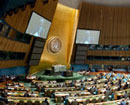 |
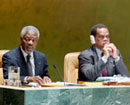 |
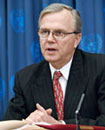 |
 |
6 September 2000
General Assembly, United Nations Headquarters,
New York.
[Read more]
|
31 October 2003
General Assembly, United Nations Headquarters,
New York.
[Read more] |
4 December 2003
Press Conference, United Nations Headquarters,
New York.
[Read more] |
18 December 2003
Signing Ceremony, United Nations Headquarters,
New York.
[Read more] |
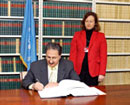 |
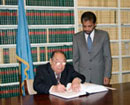 |
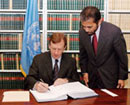 |
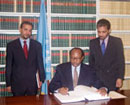 |
9 January 2004
Signing Ceremony, United Nations Headquarters,
New York.
[Read more] |
17 May 2004
Signing Ceremony, United Nations Headquarters,
New York.
[Read more] |
21 May 2004
Signing Ceremony, United Nations Headquarters,
New York.
[Read more] |
17 June 2004
Signing Ceremony, United Nations Headquarters,
New York.
[Read more]
|
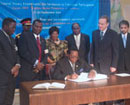 |
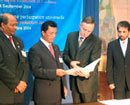 |
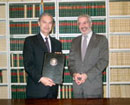 |
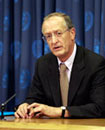 |
22 June 2004
Signing Ceremony, United Nations Headquarters,
New York.
[Read more] |
22 June 2004
Deposits of Instruments of Ratification, United Nations Headquarters,
New York.
[Read more]
|
20 July 2004
Signing Ceremony, United Nations Headquarters,
New York.
[Read more] |
15 September 2005
Press Conference, United Nations Headquarters,
New York.
[Read more] |
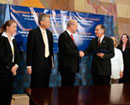 |
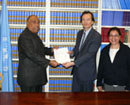 |
|
|
25 September 2007
Signing Ceremony, United Nations Headquarters,
New York.
[Read more] |
12 January 2012
Signing Ceremony, United Nations Headquarters,
New York.
[Read more] |
|
|
|
















